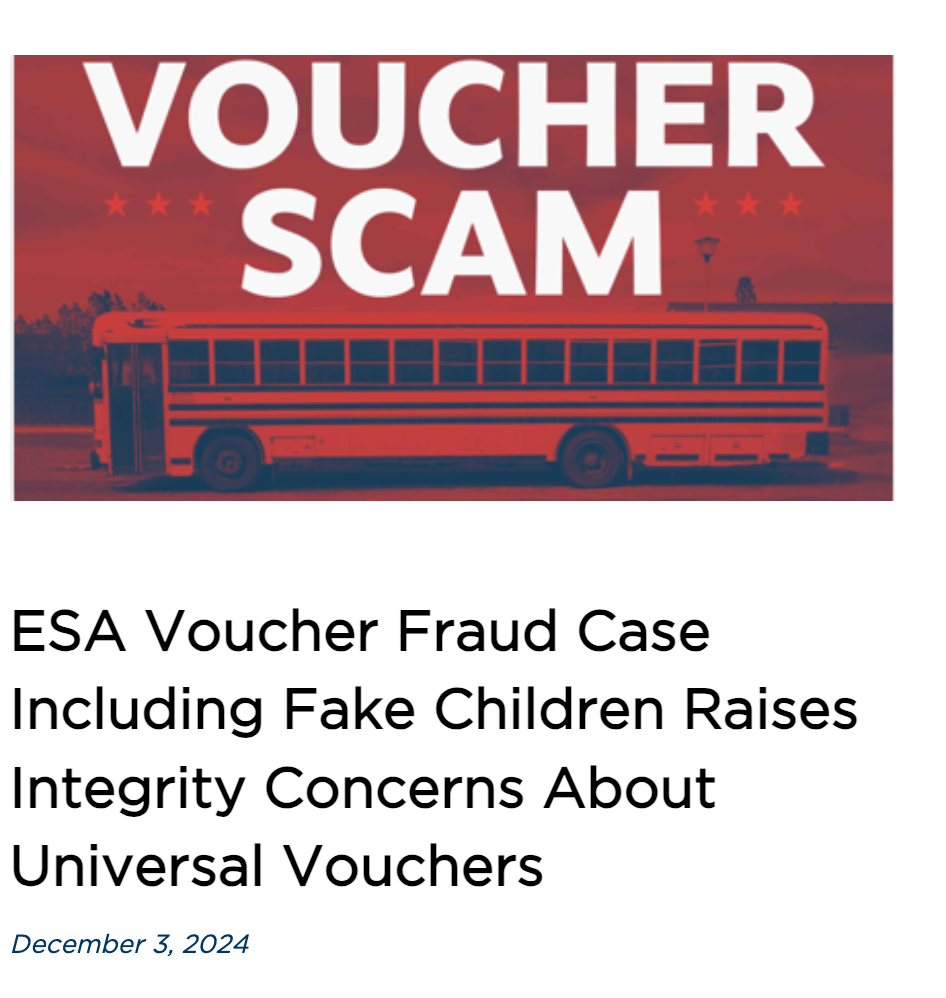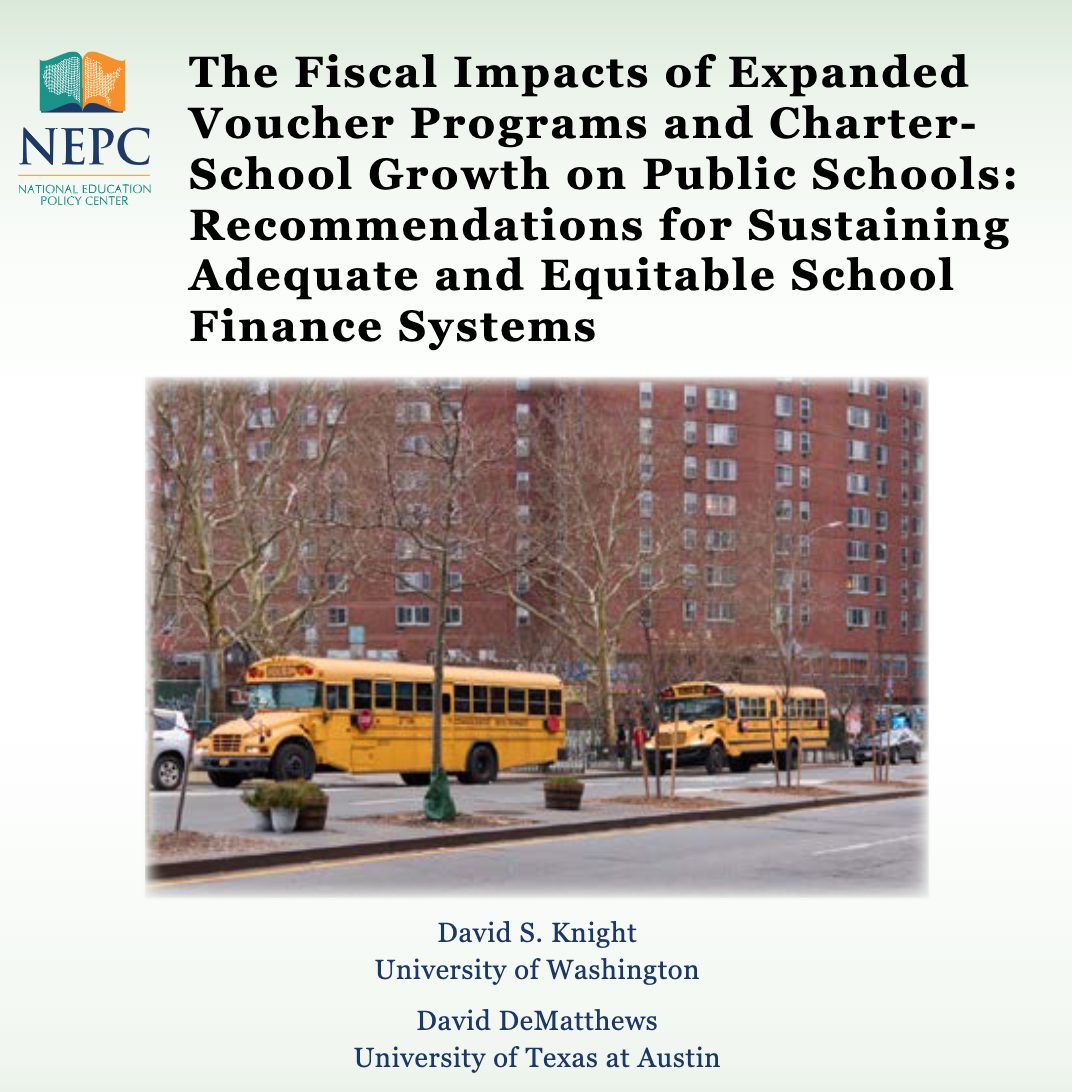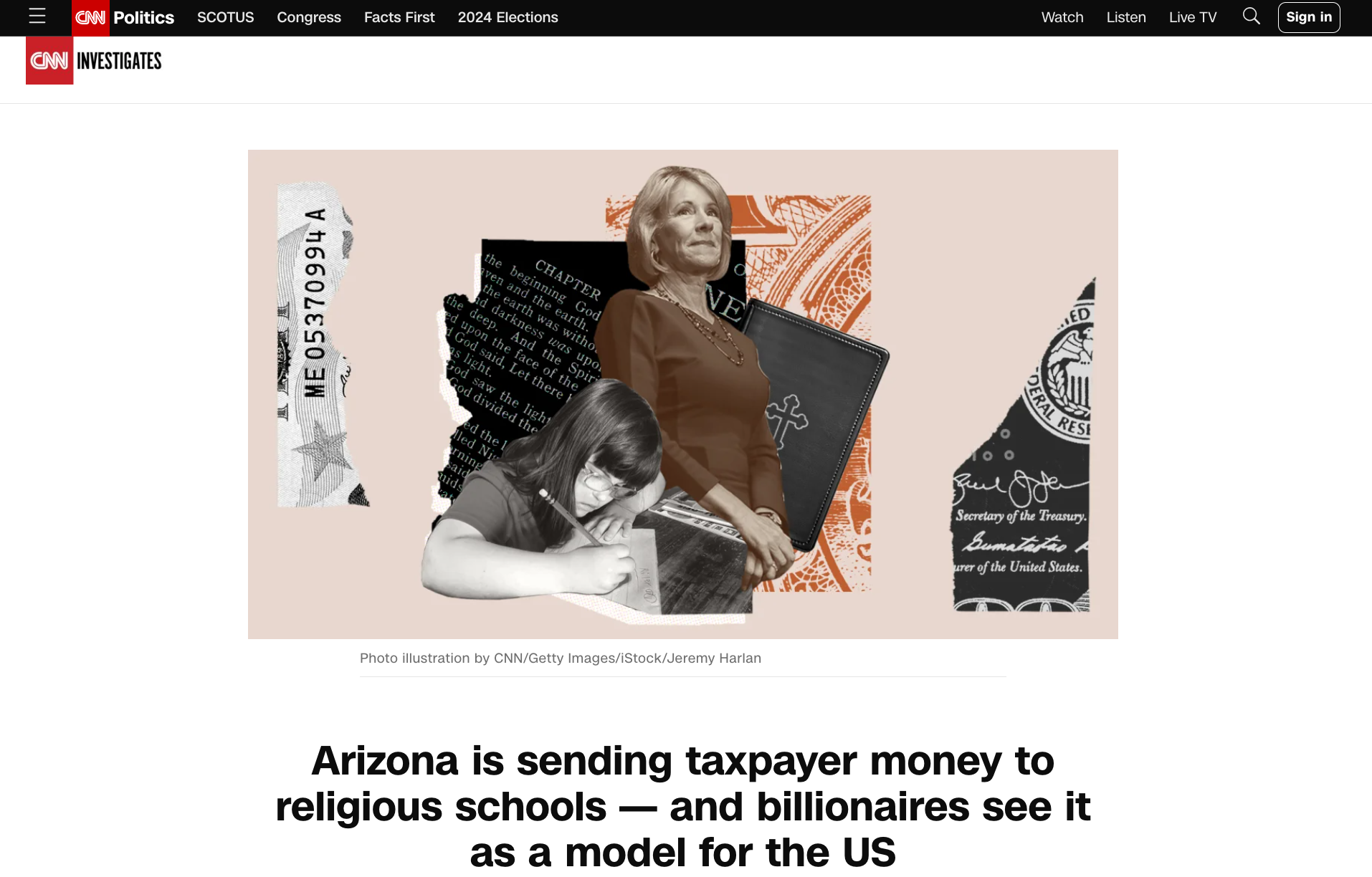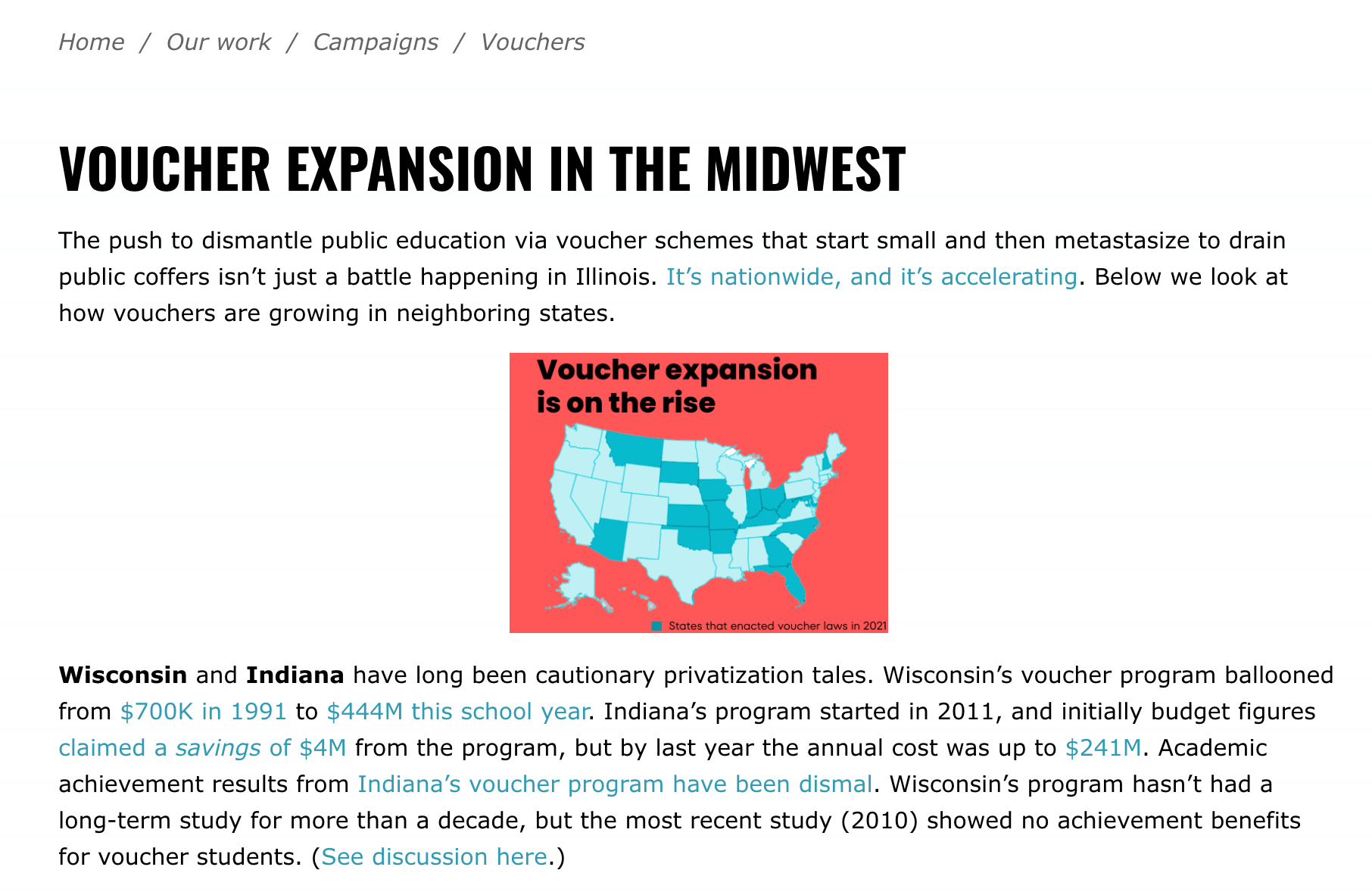ALL RESOURCES
FILTER BY TAG
Select a tag
- Academic performance
- Accessibility
- Accountability
- Advocacy
- Advocates
- Article
- Bill analysis
- Bill tracker
- Billionaires
- Blog post
- Civil rights
- Coalition building
- Community Schools
- Cost impact analysis
- Dark Money
- Data
- Disability
- Discrimination
- Drain funds from public education
- Education Savings Account (ESA)
- English language learners
- Fact sheet
- Fraud Waste and Abuse
- Graphic
- History
- Indigenous and Native Education
- Integration
- LGBTQ+
- Legislation
- Letter
- Litigation
- Messaging or talking points
- Model legislation
- National Voucher
- News
- Parents
- Personal narrative
- Podcast
- Policy brief
- Policymakers
- Radio
- Referendum
- Religion
- Report
- Rural communities
- Segregation
- Separation of church and state
- Slide deck
- Slides
- State Constitutional Right to Education
FILTER BY AUTHOR
Select an author
- Aaron Sanderford
- Alec MacGillis
- Allen Pratt
- Associated Press
- Bob Peterson
- Bruce Schreiner
- Catherine Caruso
- David Montgomery
- David Pepper
- Eli Hager
- Emily Walkenhorst
- Ethan Dewitt
- Geoff Mulvihill
- Hilary Wething
- Howard Fischer
- Jason Bailey
- Jessica Corbett
- Jim Collier
- Joe Dana
- Joshua Cowen
- Juan Perez Jr.
- Kiera Butler
- Laura Pappano
- Liam Amick
- Maurice Cunnningham
- Nora De La Cour
- Paige Masten
- Patrick Darrington
- Paul Hammel
- Phil Williams
- Rob Boston
- Robert Huber
- Rowan Moore Geretsy
- Sasha Pudelski

ESA Voucher Fraud Case Including Fake Children Raises Integrity Concerns About Universal Vouchers
On Monday, Dec. 2, news broke that an out-of-state couple were indicted for defrauding the Empowerment Scholarship Account (ESA) universal voucher program, by submitting applications for 50 children, 43 of whom do not exist, according to the Arizona Attorney General’s Office.

The Fiscal Impacts of Expanded Voucher Programs and Charter-School Growth on Public Schools: Recommendations for Sustaining Adequate and Equitable School Finance Systems
The U.S. Department of Education has projected enrollment declines over the next decade, leading to budget cuts for school districts, which will be particularly impactful in urban and rural areas serving vulnerable students. As federal COVID-19 funds expire, districts will face challenges in cutting costs, potentially leading to layoffs or school closures. Meanwhile, many states have expanded voucher programs and charter schools, diverting funds from public schools despite limited enrollment growth. Research shows these shifts harm traditional public school financing. To address this, policymakers must ensure equitable funding for public schools and hold charter and private schools to the same standards as public ones.

No-Limit Vouchers Are Blowing Up Arizona’s Budget. This Woman Is Leading the Way.
Since Arizona passed its universal voucher bill in 2022, eight more states have followed suit: Florida, Ohio, North Carolina and Indiana expanded existing voucher programs. Arkansas, Alabama, Iowa and Utah joined West Virginia, whose Hope scholarship program began in 2021, in creating new programs set to become universal. Clark’s Love Your School AZ has expanded to Alabama and West Virginia, and Clark has started a series of related groups to bolster the national ecosystem supporting school vouchers. She’s also become one of the movement’s key messengers, aided by the prestige of an appointment to the Arizona board of education, and the most visible antagonist of the state’s public school advocates.

Failing charter school closed by Az regulators reopened as a taxpayer-funded private religious school
Arizona does no vetting of new voucher schools. Not even if the school or the online school “provider” has already failed, or was founded yesterday, or is operating out of a strip mall or a living room or a garage, or offers just a half hour of instruction per morning. (If you’re an individual tutor in Arizona, all you need in order to register to start accepting voucher cash is a high school diploma.)

Protect Public Schools: An Advocacy Toolkit to Fight School Voucher Programs
School voucher programs and their many iterations (education savings accounts, tax credits, etc.) drain funds from public schools while disproportionately harming Black and Brown students from low-income backgrounds and students with disabilities. This toolkit provides the resources and information communities need to launch effective advocacy campaigns against school voucher programs in their state.

School Vouchers Were Supposed to Save Taxpayer Money. Instead They Blew a Massive Hole in Arizona’s Budget
Arizona, the model for voucher programs across the country, has spent so much money paying private schoolers’ tuition that it’s now facing hundreds of millions in budget cuts to critical state programs and projects.

The Impact of Diverting Public Money to Private School Vouchers in Kentucky
The Kentucky General Assembly enacted a private school voucher program in 2021 and legislation was filed to expand the program before the state Supreme Court struck it down for violating Kentucky’s constitution. That decision led directly to the legislature putting Amendment 2 on the ballot. Similar states that lack Kentucky’s constitutional protections for public education have recently increased spending on vouchers and school privatization at a rapidly growing cost to their budgets. Given that history and context, it is plausible to assume the legislature will pursue a similar path if voters approve the amendment.

Be wary of what you read in the school voucher debate
The information surrounding universal voucher programs is rife with advocacy masquerading as research.

They’re trying to destroy public ed': AZ superintendent unleashes frustration about misinformation concerning public school system
School superintendents typically don’t air their political grievances in public. They prefer to work behind-the-scenes with lobbyists on issues that affect their schools. But the superintendent of a prominent Arizona district is not holding back.

Arizona is sending taxpayer money to religious schools — and billionaires see it as a model for the US
A CNN investigation found that the program has cost hundreds of millions of dollars more than anticipated, disproportionately benefited richer areas, and funneled taxpayer funds to unregulated private schools that don’t face the same educational standards and antidiscrimination protections that public schools do. Since Arizona’s expanded program took effect in 2022, according to state data, it has sent nearly $2 million to Dream City and likely sapped millions of dollars from Paradise Valley’s budget.

The Dangers of Private School Vouchers for Idaho Students, Schools, and Communities
This report by Public Funds Public Schools (PFPS) and the Idaho Center for Fiscal Policy (the Center) explains why Idaho policymakers must continue to reject proposals for private school vouchers and instead invest in the state’s underfunded public education system, which serves the vast majority of children.

Stop Vouchers Webpage
Texas Governor Abbott called a special legislative session in October 2023 to press legislators to establish Texas’ first-ever private school voucher program, funded by all Texas taxpayers. Instead, Texas needs to invest in public schools that serve 5.4 million students and their families. The proposed voucher program would cost $500 million. Get resources here to help Texas say no to vouchers!

Who Supports Illinois’ Invest In Kids Voucher Program?
Voucher programs around the country—whether in the form of traditional vouchers, education savings accounts (ESAs),or tax credit scholarships—are supported by well funded and organized groups. These include: Americans for Prosperity (the Koch brothers’ 501c4), the American Legislative Education Council (ALEC), the American Federation for Children (Betsy DeVos’ 501c4), Moms for Liberty and the Heritage Foundation, among others.
What do these organizations have in common? They work openly to discredit public schools and push a privatization agenda, using the slogans of school choice, education freedom and parent rights. Many of them were on the ground working on the April 2023 school board elections in Illinois.

Voucher Expansion in the Midwest
The push to dismantle public education via voucher schemes that start small and then metastasize to drain public coffers isn’t just a battle happening in Illinois. It’s nationwide, and it’s accelerating.

Vouchers and Other Diversions of Public Funds to Private Schools
Vouchers are state-funded certificates that are used to pay tuition to private schools. Mississippians have been so opposed to using taxpayer dollars to fund private schools that our constitution bans these voucher payments. Savvy folks who have long sought to privatize our public schools now are attempting to circumvent the constitution – and the will of the people – by using tax credits and education savings accounts to funnel state tax dollars to private schools.
The most recent research on the academic impact of private school vouchers finds that voucher students experience significant losses in achievement. Prior research showed that gains in achievement were about the same for low income students receiving vouchers as they are for comparable public school students.

PFPS Webinar Series
Public Funds Public Schools lists their series of webinars on school voucher programs with descriptions and links.

SOS Arizona Network Blog
This web page from Save Our Schools Arizona is includes blogs on Arizona’s voucher program.

PFPS Interview with Richland County Public Education Partners
Robert Lominack, Executive Director of Richland County Public Education Partners (RCPEP), and Debbie Billings, a parent and public school advocate in South Carolina affiliated with RCPEP, spoke with Nicole Ciullo, Research & Policy Associate at Education Law Center. Founded in 2018, RCPEP works to improve Richland County public schools by supporting and developing innovative initiatives that assist teachers, students, and families. The interview, which was conducted earlier in the legislative session, has been edited for length and clarity.

The PFPS Interview: Molly Sweeney, Owen Goslin, and Arlyssa Heard from Michigan’s 482 Forward
PFPS continues to showcase the work of public education advocates across the country in the latest installment of the PFPS interview series. These interviews offer advice and insights for others fighting private school voucher proposals. Given the large number of voucher bills already introduced in the 2023 legislative session, sharing knowledge and inspiration from successful state and local organizations opposing these policies is more crucial than ever. This interview highlights the efforts of dedicated public school advocates in Betsy DeVos’s home state of Michigan, which remains voucher free despite powerful pro-privatization forces once again focusing their energies on establishing a voucher program in the Great Lakes State last year.

New analysis shows many private schools in N.C. have more vouchers than students
This session, General Assembly leaders have placed a massive expansion of the state’s voucher program at the top of their education agenda. Legislative leaders in both the House and the Senate want to triple the program’s size by opening it to wealthy families who have already enrolled their children in private schools. But new data shows that the existing program lacks adequate oversight and is potentially riven with fraud.
Data from the two agencies charged with overseeing private schools and North Carolina’s Opportunity Scholarship voucher program show several cases where schools have received more vouchers than they have students. Several other private schools have received voucher payments from the state after they have ceased submitting enrollment data.
